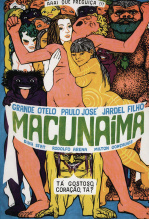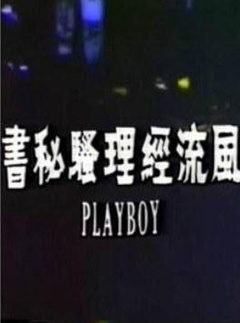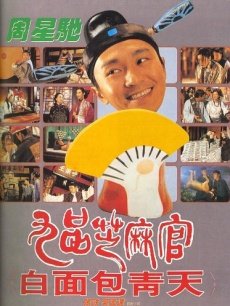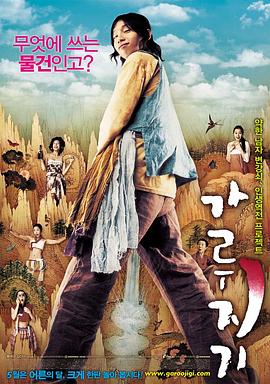- 西瓜云1
- HD

丛林怪兽
- 主演:
- Grande,Otelo,Paulo,José,扎德尔·弗赫,Dina,Sfat,米尔顿·哥恩卡维斯,Rodolfo,Arena,Joana,Fomm,Wilza,Carla
- 备注:
- 超清
- 类型:
- 喜剧片
- 导演:
- 瓦基姆·佩德罗·德·安德拉德
- 年代:
- 1969
- 地区:
- 巴西
- 语言:
- 其他
- 更新:
- 2023-03-15 10:05
- 简介:
- 本片改编自马瑞·德·安哲德的小说《狂想曲》,本片结合了现代元素的喜剧风格和传统的学院派美学于一身,演绎了一部巴西传统神话改编的史诗般的电影。是巴西60年代末电影的代表之作。在弹丸大小的丛林之中,一老妪奇迹般地产下男孩Macunaima。出生既已成人的Macunaima.....详细
本片改编自马瑞·德·安哲德的小说《狂想曲》,本片结合了现代元素的喜剧风格和传统的学院派美学于一身,演绎了一部巴西传统神话改编的史诗般的电影。是巴西60年代末电影的代表之作。在弹丸大小的丛林之中,一老妪奇迹般地产下男孩Macunaima。出生既已成人的Macunaima为了实现生命的意义,带领着家人朋友们踏上了去往大都市的旅程。一路上,光怪陆离之事接二连三地发生
For those who are wanting the essential background knowledge of Brazil’s past turmoil, chances are one (like this reviewer) may find themselves unable to suffer fools gladly of Joaquim Pedro de Andrade’s cinematic adaptation of Mário de Andrade’s titular modernist novel.
Macunaima is the son of an indigenous woman who lives in the jungle with her two other sons, the white-skinned Maanape (Arena) and the dark-skinned Jigue (Gonçalves), and Macunaima, first played by the diminutive black actor Grande Otelo smack out of his mother’s womb, is, according to the voiceover, “a hero without a character”, and indeed we are instantly seized by the film’s foolishly nihilistic, surreal style that is vigorously honed by its vibrant palette, zippy rhythm and wacky performance, especially by Otelo, who makes a helluva fun as a bawdy tot inconceivably maturing into an adolescent man, during a roll in the hay with Jigue’s lover Sofará (Fomm), magic occurs, he becomes a handsome white man (José, who also plays the role of the brothers’ mother). Pigmentation matters, even for the primordial libido.
The family’s tapir-hunting good old days come to a halt when the mother dies abruptly (after Macunaima having a brush with a cannibalistic man), whereupon the brothers moves from the tribal land to Rio de Janeiro. Macunaima is captured by a feral guerrilla fighter Ci (Sfat), together they have a son (Otelo again), but bereavement soon catches up with him, and the desultory plot takes him up against a giant merchant Wenceslau Pietro Pietra (a funnily bulked up Filho), who inexplicably has the amulet from the deceased Ci, during which a cross-dressing Macunaima tries to seduce him only to no avail, and many a raunchy snippet punctuates the story with fitful energy and idiosyncrasy, some are hilarious but all shy of a sense of reverberation.
When the wrangle with Wenceslau reaches its improbable coda (a giant swing and a swimming pool full of dismembered bodies make unusual bedfellows to settle the dissension), Macunaima and his brothers returns to their sylvan turf, and this cradle-to-grave rhapsody ends with an inane splash that a connection towards this hammock-lying imbecile is rendered futile.
High on narcissism and male chauvinism, distaff parts are patly sexualized and depicted as erotomaniacs, Joaquim Pedro de Andrade’s MACUNAIMA dates quickly in its ideology and mores, but on a lesser note, its visual grotesquerie makes it a curio worth visiting, better, if one can comb through its social analogy which is by default missing from this reviewer’s limited perspective.
referential entries: Marcel Camus’ BLACK ORPHEUS (1959, 6.2/10); Antonio Carlos da Fontoura’s THE DEVIL QUEEN (1974, 6.3/10)."<>"" && "
For those who are wanting the essential background knowledge of Brazil’s past turmoil, chances are one (like this reviewer) may find themselves unable to suffer fools gladly of Joaquim Pedro de Andrade’s cinematic adaptation of Mário de Andrade’s titular modernist novel.
Macunaima is the son of an indigenous woman who lives in the jungle with her two other sons, the white-skinned Maanape (Arena) and the dark-skinned Jigue (Gonçalves), and Macunaima, first played by the diminutive black actor Grande Otelo smack out of his mother’s womb, is, according to the voiceover, “a hero without a character”, and indeed we are instantly seized by the film’s foolishly nihilistic, surreal style that is vigorously honed by its vibrant palette, zippy rhythm and wacky performance, especially by Otelo, who makes a helluva fun as a bawdy tot inconceivably maturing into an adolescent man, during a roll in the hay with Jigue’s lover Sofará (Fomm), magic occurs, he becomes a handsome white man (José, who also plays the role of the brothers’ mother). Pigmentation matters, even for the primordial libido.
The family’s tapir-hunting good old days come to a halt when the mother dies abruptly (after Macunaima having a brush with a cannibalistic man), whereupon the brothers moves from the tribal land to Rio de Janeiro. Macunaima is captured by a feral guerrilla fighter Ci (Sfat), together they have a son (Otelo again), but bereavement soon catches up with him, and the desultory plot takes him up against a giant merchant Wenceslau Pietro Pietra (a funnily bulked up Filho), who inexplicably has the amulet from the deceased Ci, during which a cross-dressing Macunaima tries to seduce him only to no avail, and many a raunchy snippet punctuates the story with fitful energy and idiosyncrasy, some are hilarious but all shy of a sense of reverberation.
When the wrangle with Wenceslau reaches its improbable coda (a giant swing and a swimming pool full of dismembered bodies make unusual bedfellows to settle the dissension), Macunaima and his brothers returns to their sylvan turf, and this cradle-to-grave rhapsody ends with an inane splash that a connection towards this hammock-lying imbecile is rendered futile.
High on narcissism and male chauvinism, distaff parts are patly sexualized and depicted as erotomaniacs, Joaquim Pedro de Andrade’s MACUNAIMA dates quickly in its ideology and mores, but on a lesser note, its visual grotesquerie makes it a curio worth visiting, better, if one can comb through its social analogy which is by default missing from this reviewer’s limited perspective.
referential entries: Marcel Camus’ BLACK ORPHEUS (1959, 6.2/10); Antonio Carlos da Fontoura’s THE DEVIL QUEEN (1974, 6.3/10)."<>"暂时没有网友评论该影片"}
For those who are wanting the essential background knowledge of Brazil’s past turmoil, chances are one (like this reviewer) may find themselves unable to suffer fools gladly of Joaquim Pedro de Andrade’s cinematic adaptation of Mário de Andrade’s titular modernist novel.
Macunaima is the son of an indigenous woman who lives in the jungle with her two other sons, the white-skinned Maanape (Arena) and the dark-skinned Jigue (Gonçalves), and Macunaima, first played by the diminutive black actor Grande Otelo smack out of his mother’s womb, is, according to the voiceover, “a hero without a character”, and indeed we are instantly seized by the film’s foolishly nihilistic, surreal style that is vigorously honed by its vibrant palette, zippy rhythm and wacky performance, especially by Otelo, who makes a helluva fun as a bawdy tot inconceivably maturing into an adolescent man, during a roll in the hay with Jigue’s lover Sofará (Fomm), magic occurs, he becomes a handsome white man (José, who also plays the role of the brothers’ mother). Pigmentation matters, even for the primordial libido.
The family’s tapir-hunting good old days come to a halt when the mother dies abruptly (after Macunaima having a brush with a cannibalistic man), whereupon the brothers moves from the tribal land to Rio de Janeiro. Macunaima is captured by a feral guerrilla fighter Ci (Sfat), together they have a son (Otelo again), but bereavement soon catches up with him, and the desultory plot takes him up against a giant merchant Wenceslau Pietro Pietra (a funnily bulked up Filho), who inexplicably has the amulet from the deceased Ci, during which a cross-dressing Macunaima tries to seduce him only to no avail, and many a raunchy snippet punctuates the story with fitful energy and idiosyncrasy, some are hilarious but all shy of a sense of reverberation.
When the wrangle with Wenceslau reaches its improbable coda (a giant swing and a swimming pool full of dismembered bodies make unusual bedfellows to settle the dissension), Macunaima and his brothers returns to their sylvan turf, and this cradle-to-grave rhapsody ends with an inane splash that a connection towards this hammock-lying imbecile is rendered futile.
High on narcissism and male chauvinism, distaff parts are patly sexualized and depicted as erotomaniacs, Joaquim Pedro de Andrade’s MACUNAIMA dates quickly in its ideology and mores, but on a lesser note, its visual grotesquerie makes it a curio worth visiting, better, if one can comb through its social analogy which is by default missing from this reviewer’s limited perspective.
referential entries: Marcel Camus’ BLACK ORPHEUS (1959, 6.2/10); Antonio Carlos da Fontoura’s THE DEVIL QUEEN (1974, 6.3/10).















